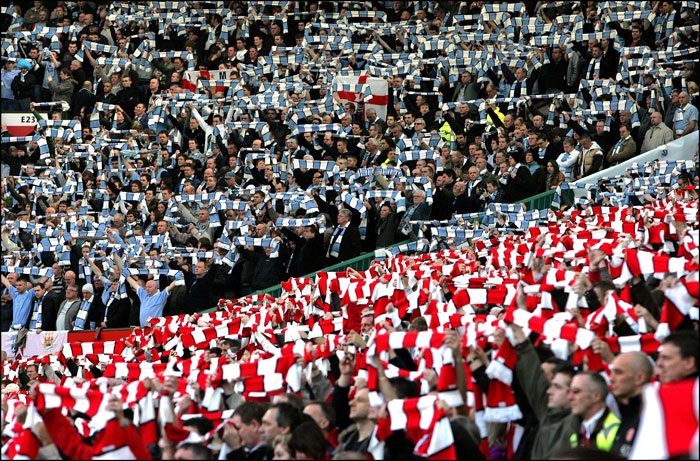Football Fandom - Why Are We Really Here?
By Ahsan Naeem | 03 March 2020(Photo by Andrew Yates/AFP)
Either football is having an existential crisis, or I’m having an existential crisis about the sport I’ve grown to love like other people love art, or ballet, or collecting stamps. The proliferation of negativity feels like it has reached a fever pitch this season. Whether the conversation is about Ed Woodward, Watford’s trigger-happy owners or about empty seats, the narratives around the game seem more obsessed with what’s wrong than ever before. Now, maybe there are more problems with football than ever before. I’m not here to tell anyone who thinks modern football is broken that they are wrong. But I’m beginning to wonder whether the narrative setters are forgetting about us.
Why are we really here? Why do you do it? Whether you’re a lifelong season ticket holder in Manchester or you’re a distant supporter waking up at 4 am in some far-flung country to watch your team. What’s the point? I’ve been asking myself that a lot recently. I love watching City, in fact I love watching football. I find pleasure in the escape of the 90 minutes. The beauty of a wand of a left foot curling a cross into the box. A defence-splitting pass which leaves a back four looking redundant. A last-minute win and a last-minute defeat are just two sides of the same emotional coin. These things make me feel alive the same way a great song does. That’s why I’m here. Or at least that’s why I thought I was here.
Fandom is changing, not just for City supporters, for all supporters. Social media has amplified the tribalism exponentially. We now fight fires 24/7, 365 days a year. Whereas growing up and even a decade ago, my only interaction with other supporters was friends who supported a rival or on match day or occasionally when an interloping United supporter was outed on Bluemoon, today I cannot navigate Twitter, Facebook, the internet in general, without finding myself triggered by something disparaging about the club I support. I imagine it’s the same whoever you support actually, especially if you’re a supporter of a Premier League club. We’ve taken the match day gladiatorial experience and placed it online so it’s a perpetual daily cycle (or grind).
This is where the narratives become important. In the old days the main dividing line between supporter bases was the thing we’re all here for, football. But the football itself can only sustain so many narratives, and as the internet and social media age has given rise to the 24/7 rolling news cycle, the football alone has not been able to sustain the narratives. And so they’ve become ever more imaginative. More elaborate. The narratives are now almost exclusively non-football related. How many column inches have been devoted to Ed Woodward this season, or Financial Fair Play, or the corruption at FIFA? I imagine with the sole exception of Liverpool, who it seems are exempt from the narrative, every other Premier League supporter can point to a non-football narrative that has dominated their season, sucking the joy and life from the experience of being a supporter.
So to the narrative setters and what their responsibility is. I’ve just had an illuminating conversation with a former journalist, now a television producer. He name-checked a football writer he knows and told me something which didn’t surprise me at all. Said writer is encouraged to stoke the fires of rivalry online and is encouraged to write from an increasingly divisive point of view. It’s the Tekashi 69 model business model. The same people who hated him the most, who despised his narrative, were the ones buying the tickets, clicking on the songs and the videos. Football writers have sussed that most people will click on a negative story about their club faster than on a positive one. They’ll share the negative story more widely on social media. The engagements, the clicks, the metrics, the analytics, they’re all telling the narrative setters that we’re sadists.
Except I’m not a sadist. I imagine there are few supporters who are. We aren’t here for a forensic breakdown of our CEO’s professional experience, and we’re not here to be told what’s broken about our manager, players, club or match day experience. We know all that stuff already because we have a far more intimate relationship with our club than any narrative setter does. I realised something else this weekend. Football is not, and should not, be ‘news’. For one very simple reason. Because it’s our escape. Our 90 minutes away from what’s wrong with the world. As my wife often says, it’s 22 grown arsed men kicking a pig’s bladder around on a manicured lawn for the entertainment of the masses. I don’t need to know how good or bad Ed Woodward is any more than I need to know how talented the CEO of Sony Pictures is before I go and watch a film.
So why am I really here? I guess that I’m here for the laugh.The craic. The buzz. The feeling of escapism that the football gives me. I’m here for the belonging, the camaraderie, the friendship. I’m here to see the magic in Kevin De Bruyne’s boots or the two left feet of Nicolas Otamendi. I’m here to see the greatest City team ever put together lose to a banger from Jordan Ayew. I’m for everything but the narrative. The narrative. That’s increasingly for the others. I’m convinced football writers write for each other, not for us. The intellectualisation of football is a modern phenomenon which needs to get in the bin before the stadiums empty. Because eventually they’ll wear us all down. Eventually we’ll find something else for escapism. Something else to fill our weekends. And when we leave town, the entire show ceases to exist. Including the narrative setters.
Why are we really here? For each other. For the team. The club we belong to. We’re not here for them. They are here for us, and they should serve us. If they don’t serve us, we should stop allowing them to sully the experience. This isn’t just about City, it’s about all of us. We’re all the same, and we’re not them. They are freeloading from ground to ground, from match to match. The only thing they care about is clicks and hits and engagements. If they cared about the game they’d go and work at the FA or FIFA. Writing about stuff nobody wants to read about or writing about stuff to stoke rivals’ anger isn’t providing a service to any of us. It’s making the experience worse.
None of this is to say that football writing doesn’t have its place. But the onus is on them to do better, to understand that what they do is a privilege we afford them. Not the other way round. To begin to understand that our only desire is to escape the grind of daily life over 90 minutes. If we have to spend the remaining 167.5 hours of the week being brow beaten over the relative morality of different types of billionaires or being told that the game we love is forever broken, then eventually we’re all head for the exit. And I know for a fact that nobody wants that.

(Photo by Andrew Yates/AFP)
